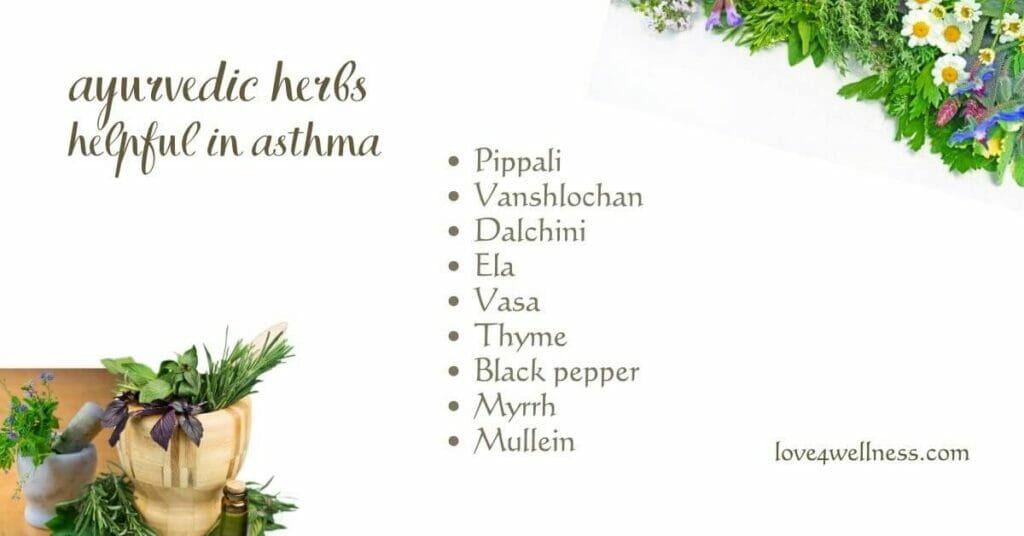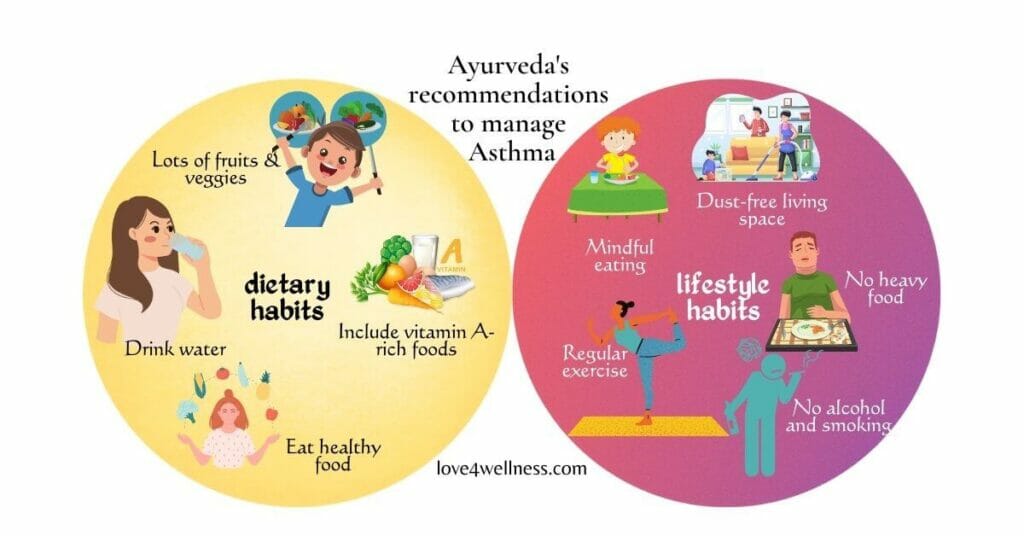Ayurveda does not have a cure for Asthma, but it does recommend many ways to help reduce and manage the symptoms.
Ayurveda refers to asthma as ‘Swasa Rog,’ indicating breathing difficulties. According to Ayurveda, asthma is attributed to the abnormal movement of Vata in the airways or respiratory tracts. Vata’s astringent and dry qualities can cause airway constriction, while Kapha may also play a role. Kapha not only obstructs the respiratory tract but also transforms the normally liquefied mucus into a sticky and thick form, leading to inflammation.
From a Western medical perspective, the causes of asthma are complex, involving interactions between environmental factors and genetics. These causes are often not fully understood. However, Ayurveda views asthma differently, suggesting that it originates in the stomach (Pitta) due to the simultaneous excretion of Vayu and Kapha.
This article briefly explains Ayurveda’s approach to treating asthma, including Ayurvedic home remedies, herbs, diet, and lifestyle practices.
Recommended Reads
- How Can Ayurveda Help Improve Brain Functions?
- The Ten Most Important Things You Must Know About Ayurveda
- Five Natural Home Remedies You Can Try Instead Of Cough Suppressants
- Try This Wonderful Home Remedy For Sore Throat Using Ginger And Honey
Ayurveda Home Remedies for Asthma
Home remedies are considered one of the most effective, easy, and popular approaches when treating asthma with Ayurveda. The popularity of these home remedies for easing asthma symptoms stems from their easy availability.
However, it’s important to note that the remedies and their effects may vary depending on the type of asthma, such as allergic or non-allergic asthma. Let’s explore some of the common Ayurveda home remedies:
1. Ginger Tea
Consuming ginger tea, optionally mixed with a teaspoon of honey and crushed garlic cloves, can help alleviate airway congestion caused by the accumulation of “kapha,” which contributes to increased asthma attacks.
2. Garlic
Garlic, a readily available kitchen ingredient, offers immediate relief from asthma-related breathing difficulties. Drinking a glass of lukewarm water with the freshly extracted juice of 15 garlic cloves can provide relief.
3. Honey and Cinnamon
Sipping honey mixed with warm water or consuming a mixture of cinnamon powder and honey can offer significant relief from accumulated phlegm or “kapha” in the throat during asthma. Consuming cinnamon powder with honey at night promotes restful sleep by addressing the breathlessness associated with asthma.
4. Honey and Pepper
Mixing pepper with honey and a small amount of onion juice can help reduce breathlessness and congestion.
5. Bay Leaf, Pippali, and Honey
Taking a mixture of ¼ teaspoon of pippali, half a teaspoon of bay leaf, and one teaspoon of honey three times a day can effectively prevent chronic asthma symptoms.
6. Figs
Figs work wonders in removing phlegm from the airways and respiratory system. This Ayurvedic remedy yields amazing results when consumed every morning on an empty stomach for around two months. Typically, soaked figs and the water they are soaked in are consumed for maximum benefits.
7. Black Pepper
Topically applying a paste of black pepper, turmeric powder, and ghee provides a soothing effect on the throat and chest when experiencing asthma symptoms.
8. Fenugreek Seeds
Consuming fenugreek seeds soaked overnight in water, along with ginger juice and honey, offers quick relief from asthma symptoms. For optimal results, this mixture is recommended twice daily, once in the morning and once in the evening.
Ayurvedic Herbs for Asthma
Ayurveda is well-known for using the natural power of herbs to address different health concerns. When it comes to asthma, Ayurvedic practitioners use a variety of herbs that not only boost the body’s immune system but also enhance overall bodily functions, which can naturally relieve asthma symptoms without any negative side effects.
- Pippali:
The Ayurvedic herb Pippali, or long pepper, prevents asthma and strengthens the respiratory system. It rejuvenates and promotes blood circulation in the lungs and addresses cold and mucus conditions in the respiratory system.
- Vanshlochan
Vanshlochan, derived from the bamboo plant, prevents asthma and improves respiratory function.
- Dalchini or Cinnamon
Cinnamon has antimicrobial properties that combat pathogenic microbes in the airways and respiratory tracts. It also helps eliminate excess mucus from the respiratory system and lungs.
- Cardamom or Ela
Cardamom seeds possess pungent and warm properties that reduce Kapha and Vata. In addition to effectively treating colds and influenza, cardamom shows promising results in alleviating asthmatic symptoms.
- Vasa
Vasa is a highly effective Ayurvedic herb that provides relief from asthma symptoms. It widens the airways, relaxes the bronchial muscles, and helps loosen mucus, particularly in the lungs.
- Thyme
Thyme, also known as Ephedra, acts as an effective Ayurvedic bronchodilator and expectorant, relieving asthma-related breathing difficulties.
Other Ayurvedic herbs used to treat asthma include black pepper, myrrh, and mullein. These herbs are usually found in different herbal formulas and are mainly used as supplements to prevent the asthma condition from worsening while treating respiratory disease. It is crucial to understand that Ayurvedic herbs should not be mistaken for allopathic rescue medicines, such as rescue inhalers.
Ayurveda therapy – Panchakarma
Panchakarma is an Ayurvedic approach to treating various illnesses by addressing deep-rooted imbalances within the body. It employs Ayurvedic herb solutions, remedies, and medicines to restore balance.
True to its name, Panchakarma involves five purification processes: ‘Vamana’ (therapeutic vomiting), ‘Virechana’ (purgation therapy), ‘Nasya’ (nasal administration), ‘Niroohavasti’ (decoction enema), and ‘Anuvasanavasti’ (oil enema).
The treatment uses various techniques for managing asthma symptoms. For instance, rubbing Ayurvedic oils produced from brown mustard or sesame seeds on the chest or administering Ayurvedic medicines through the nose are among the approaches employed. These techniques help alleviate asthma symptoms and promote respiratory health as part of the comprehensive Panchakarma therapy.
For asthma patients, Panchakarma can be hugely beneficial as it focuses on enhancing the body’s immunity while rejuvenating the mind, soul, and body.
Ayurveda-recommended diet, daily routine and lifestyle changes
In Ayurveda, asthma is attributed to indigestion, nervous system deterioration, and imbalances caused by mental and physical stress. To restore the body’s natural balance, self-repairing ability, and healing power, Ayurveda emphasises the importance of improving daily routines and implementing lifestyle changes. Here are some Ayurveda-approved recommendations for preventing asthma and managing its symptoms:
Dietary changes
According to Ayurveda, poor digestion can lead to the accumulation of impurities and toxins in the airways, triggering the development of asthma. Therefore, appropriate dietary changes are crucial for preventing asthma and managing its symptoms effectively. While Ayurvedic herbs and remedies are valuable treatment approaches, Ayurveda emphasises the importance of a balanced daily diet to prevent asthma and provide long-term relief. Here are some Ayurveda-approved dietary changes:
- Stay hydrated with lukewarm water: Asthma patients should prioritise staying hydrated and avoid chilled or cold drinks. Opting for lukewarm water can also be beneficial for maintaining respiratory health.
- Avoid stomach-upsetting foods: Asthma patients need to identify and avoid foods that can upset the stomach or contribute to the accumulation of Kapha, a dosha associated with respiratory issues.
- Include fresh fruits and leafy green vegetables: Incorporating fresh fruits and leafy green vegetables into the daily diet is essential, as they are rich in antioxidants and can support respiratory health.
- Consume foods rich in Vitamin A: Vitamin A plays a significant role in treating asthma and other respiratory problems. Including foods rich in Vitamin A, such as carrots, sweet potatoes, and spinach, can be beneficial.
For more diet-related Ayurveda tips specifically tailored to treating asthma, it is advisable to consult with a qualified Ayurveda professional who can provide personalised guidance.
Lifestyle habits
- Practice mindful eating: Avoid overeating and consume meals in moderation, never exceeding your eating capacity.
- Create a clean environment: Steer clear of dusty places to minimise the risk of triggering asthma attacks.
- Opt for warm beverages: Refrain from drinking cold water and choose warm drinks instead, as they promote better respiratory health.
- Engage in regular exercise: Incorporate exercises like swimming or yoga into your routine, because they can help improve lung function and ease breathing difficulties.
- Avoid heavy and cold meals: Further, asthma patients should avoid heavy and cold foods, as they can aggravate symptoms.
- Say no to smoking and alcohol: Smoking and consuming alcohol or tobacco can worsen respiratory problems, so it’s crucial for asthma patients to avoid these habits.
- Establish a balanced daily routine: An improper daily routine disrupts the body’s natural cleansing and healing cycles, leading to Vata imbalance. Prioritise regular sleeping patterns, balanced meals, and a consistent daily routine to maintain overall well-being.
It’s important to consult with an Ayurveda professional to receive personalised guidance on specific lifestyle changes and daily routine modifications that can effectively manage asthma and restore balance to your body.
Love4wellness concludes,
Asthma cannot be cured completely but can significantly be managed with a proper diet and healthy lifestyle practices suggested by the ancient science of Ayurveda. Though the recommended Ayurvedic practices and herbs seem harmless, it is crucial to take guidance from an expert to see long-term, sustaining relief from asthmatic symptoms.
Images: canva.cm


